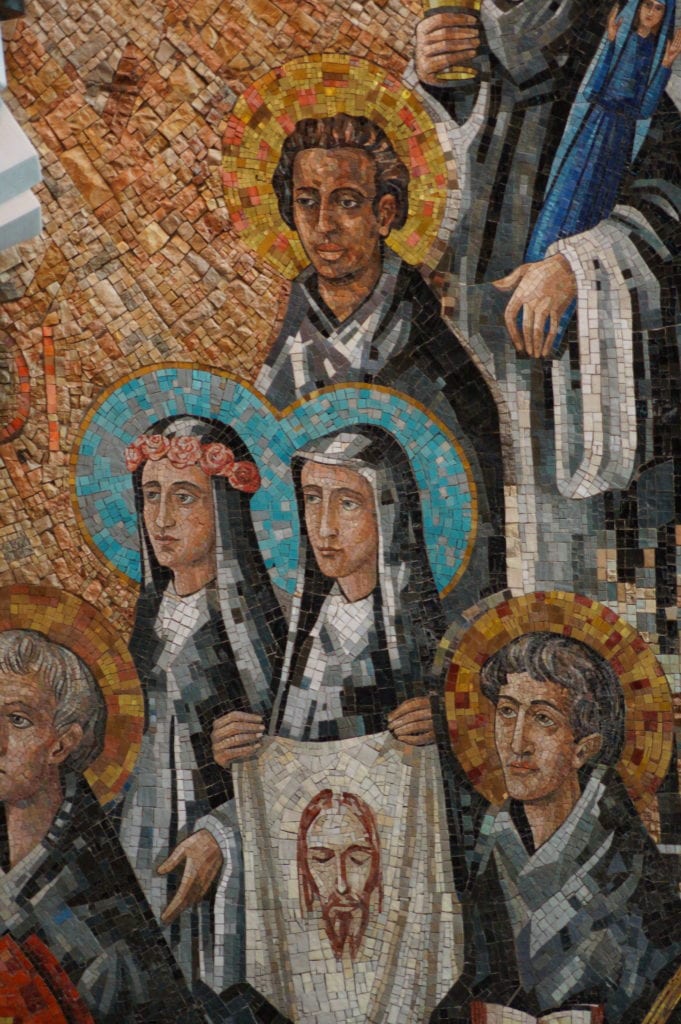Springfield Dominican Sister Rose Miriam Schulte, a member of the congregation's leadership team, preached this homily during evening prayer at Sacred Heart Convent on Sunday, August 23, the Feast of Dominican lay woman St. Rose of Lima.
The Gospel Text:
Matthew 16:24-27
Then Jesus said to His disciples, "If anyone wishes to come after Me, he must deny himself, and take up his cross and follow Me. "For whoever wishes to save his life will lose it; but whoever loses his life for My sake will find it. "For what will it profit a man if he gains the whole world and forfeits his soul? Or what will a man give in exchange for his soul? "For the Son of Man is going to come in the glory of His Father with His angels, and WILL THEN REPAY EVERY MAN ACCORDING TO HIS DEEDS.
Rose of Lima took this Gospel mandate to heart. Denial of self, embracing the cross, and choosing Jesus as the Way, Truth, and Life were the hallmarks of her life. . . a life which gives testimony to a graced process of transformation.
As I began my personal reflection I wondered what timely insight I might gain into the life of our beloved Rose ? What common ground would strengthen my/our Dominican life and mission? I needed to look no further than to the to the graced fabric of her life.
Rose was born in Lima, Peru in 1586 a mere 20 years after the Council of Trent which resisting any movement toward dialogic study strenuously affirmed all of the earlier church doctrine with the exception of indulgences. The arm of the papacy known as the Inquisition was hereby strengthened in its charge to rout out all signs of heresy, in areas of the world under Catholic control.

Peru was under Catholic control. She had been forcefully seized for Spain by Francisco Pizarro some fifty years earlier. The expansive Peruvian mineral resources were being mined and shipped back to Spain. Peru’s indigenous peoples, the victims of conquest, brutality, and injustice were left oppressed and impoverished. While some courageous and outspoken missionaries attempted to alleviate the plight of the native Peruvians, the Doctrine of Discovery promulgated as a papal bull by Pope Alexander the VI allowed the conquistadors a spiritual, political, and legal justification for colonization and seizure of land not inhabited by Christians.
Against this backdrop of religious and political realities, Rose was born into a wealthy, “upper class” Catholic family of Lima. She was the daughter of Gaspar del Flores, a Spanish soldier whose military career put him in favor with the ruling Spanish Viceroy and his young wife Maria del Olivia, of Spanish descent with a mixture of Inca blood. Named Isabel at baptism after her aunt Godmother she was renamed Rose due to the beauty of her countenance.
Thus Rose spent her early childhood in a comfortable villa in Lima suitable for a family of the ruling class. Given her social status, wealth, and personal beauty her parents expected her to make a brilliant marriage which would undoubtedly open up into a bright future for her and possibly other members of her family.
Rose is described as intelligent, strong willed, precocious, and conscientiously obedient to her parents yet not beyond openly expressing the desires of her heart even when they were contrary to her parents’ wishes. Rose’s desire to follow in the path of Catherine of Siena as a Dominican nun took root at an early age upon learning of Catherine’s austere and saintly life from the Spanish Dominican friars, who had arrived in Peru (first as companions of the conquistadors) and later to establish the monastery of St. Dominic in Lima.
Her desire for vowed religious life stood in stark contrast to her parents’ plans to wed her to anyone of the several well-established suitors. After years of resistance Rose and her parents came to an agreeable compromise facilitated by the beloved Archbishop Turibio. At about the age of 20 Rose became Dominican tertiary while living with her family. As a Dominican tertiary, Rose robed in the habit, allowed to participate in the Divine Office, and frequently approach the banquet table of the Lord. It was likely at the monastery that she first encountered Martin dePorres. Kindred spirits, Rose and Martin became life-long friends. Rose integrated austere penances, solitary prayer and contemplation into her sacred activism, convincing her mother to afford her a small garden space in their home as a hermitage.
When Rose was still a young woman, her father Gaspar suffered serious financial losses after having been caught up in the Spanish quest for wealth through mining projects in the Andes. The family had moved to the site of Gaspar’s brief employment in Quives and reduced to hard times, did not have the resources to return to Lima. Rose helped support her impoverished family by selling her beautiful handwork in the local market. She is also said to have grown beautiful flowers and medicinal herbs not unlike her friend, Martin dePorres.
It was in Quives that Rose encountered the broader Peruvian society. The farm workers and miners were Indigenous peoples pressed into service by the wealthy Spanish owners. Rose became sister to her oppressed neighbors: the Indians, mulatos, or black persons . . . the rostros concretos of the marginalized. Though restricted in means herself she ingeniously found ways of caring for the needy . . . . often to the chagrin of her mother! In one account her mother reports that the first beggar Rose met in Quives was brought to the family home where Rose cleansed his cancerous sores, mended his clothes, and even washed his feet! As word of Rose’s charity spread so did the numbers of needy who appeared at her door. No one was turned away.
Meanwhile, Rose continued the ascetical practices of her early life. Likely perceived by us as extreme or even self-abusive such penitential rubrics flowed from an austere militant mystical Catholicism implanted in the New World by her European ancestors. Rose’s identification with her crucified Lord was central to her life became more intense after her mystical espousal with her beloved Lord. At times she experienced extreme spiritual dryness, a sense of abandonment by God, visions of her personal damnation, coupled with agonizing physical pain. All of these she lovingly accepted and offered in her prayer for the world.
The last few years of Rose’s short life were spent in the home of a Spanish government official, Don Gonzalo de Massa after Rose became friends with his wife Maria. Though a guest in their home, Rose continued to bring to her small quarters the homeless children, elderly and sick for whom she cared. Living under the roof of a government official did not prevent her open protestations against the harsh practices of the Spanish overlords nor allegations of excessive greed on the part of the ruling class.
Rose died on the 24th of August 1671 at the age of thirty-one. Ironically the Spanish officials, whom she had criticized for their misuse of power vied with one another for the privilege of carrying her coffin. Her funeral had to be postponed several days due to the throngs of diverse peoples who made their way to honor her.
The record of her canonization process states that a deciding factor toward recognizing the depth of her charity came to light during her own Inquisition. Taunted toward resentment or even slander by her inquisitors, Rose refused to be critical of, and even lovingly forgave, those who were relentless in their ridicule of her penitential practices, chastised her for demeaning her family by stepping outside her privileged place in society to become an ally of the oppressed, presented obstacles to her works of mercy, and consistently questioned her motives.
Rose was declared a saint in 1671—only 54 years after her death—in an expedited canonization. Her beloved friend and confidant Martin dePorres was also canonized but not until 1962 . . . likely postponed due to the color of his skin and his “illegitimate” birth.
Holy Mystery ever Ancient, ever new, we thank you for the life of Rose of Lima and ask that we too might be transformed through contemplation to listen deeply to one another and to the brokenness of the world.
Bless our efforts to be the holy Preaching.



Dear Sister Rose Miriam,
Thank you. It was so wonderful to be able to read your homily from Sunday. What an inspiration you are to so many of us. I will miss you when I move but just remember, the next time you and Sister Paul Mary go fishing I will be right on your way. Hope the two of you will be able to go fishing next summer and stop by to see me on the way. I know I will miss the Sisters when I’m gone but all of you will be in my thoughts and especially in my prayers. May God continue to bless you as you bless all who come in contact with you. You truly are a joyful representative of the Dominican Charism.
God Bless you,
Love,
Barbara Hattes
Great to hear from you Barb! We’ve passed your kind words on to Sister Rose Miriam.